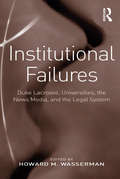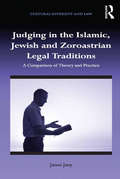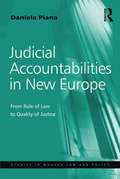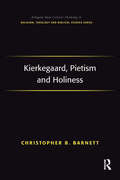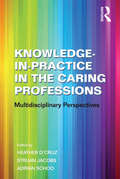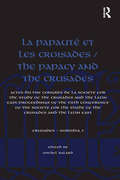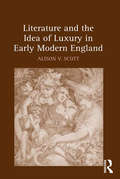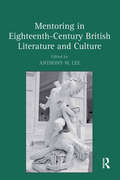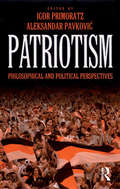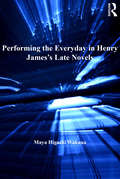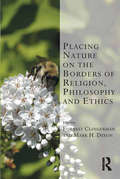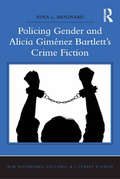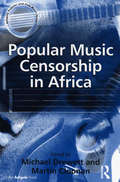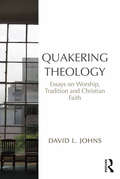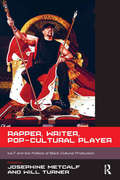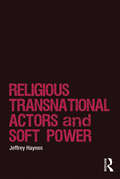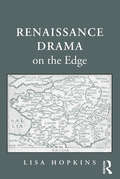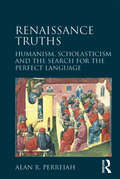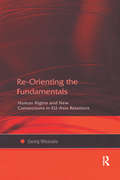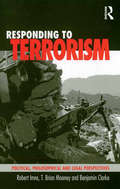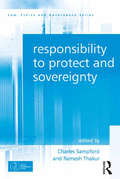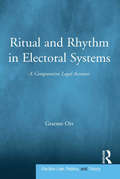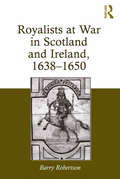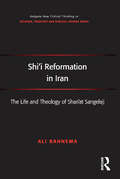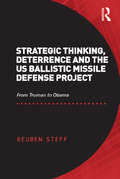Special Collections
Benetech’s Global Certified Accessible Titles
Description: Benetech’s GCA program is the first independent third-party EPUB certification to verify ebook accessibility. By creating content that is born accessible, publishers can meet the needs of all readers. Learn more: https://bornaccessible.benetech.org/
- Table View
- List View
Institutional Failures
by Howard M. WassermanThe authors of this new collection argue that the many features of the now-infamous Duke University men’s lacrosse controversy are best understood in the context of the three major socio-legal institutions in which the drama played out. The legal system, Duke University, and the news media all struggled to respond to and handle the case, tinged as the events were with race, sex, violence, class, privilege, and notions and perceptions about sports. The problems, missteps, mistakes, and injustice in the case resulted from each institution's failure to operate properly, from the incentives built into each institution that affected individual behavior, and from the inability of each institution to communicate and cooperate with the others. To understand the Duke lacrosse controversy is to study these institutions and to answer questions about the performance of each-to learn what each did right and wrong and why, and to consider how each can improve in the future. By examining the actions of these institutions and the individuals within them, these essays consider the role each played in the case, how each contributed to the crisis and to its resolution, the ways in which they interacted with one another, and the lessons this case teaches about the appropriate functioning of each institution.
Judging in the Islamic, Jewish and Zoroastrian Legal Traditions
by Janos JanyThis book presents a comparative analysis of the judiciary in the Islamic, Jewish and Zoroastrian legal systems. It compares postulations of legal theory to legal practice in order to show that social practice can diverge significantly from religious and legal principles. It thus provides a greater understanding of the real functions of religion in these legal systems, regardless of the dogmatic positions of the religions themselves. The judiciary is the focus of the study as it is the judge who is obliged to administer to legal texts while having to consider social realities being sometimes at variance with religious ethics and legal rules deriving from them. This book fills a gap in the literature examining Islamic, Jewish and Zoroastrian law and as such will open new possibilities for further studies in the field of comparative law. It will be a valuable resource for those working in the areas of comparative law, law and religion, law and society, and legal anthropology.
Judicial Accountabilities in New Europe
by Daniela PianaThis volume focuses on a highly challenging aspect of all European democracies, namely the issue of combining guarantees of judicial independence and mechanisms of judicial accountability. It does so by filling the gap in European scholarship between the two policy sectors of enlargement and judicial cooperation and by taking full stock of an interdisciplinary literature, spanning from comparative politics, socio-legal studies and European studies. Judicial Accountabilities in New Europe presents an insightful account of the judicial reforms adopted by new member States to embed the principle of the rule of law in their democratic institutions, along with the guidelines of quality of justice promoted by European institutions in all member States.
Kierkegaard, Pietism and Holiness
by Christopher B. BarnettSøren Kierkegaard wrote that Pietism is 'the one and only consequence of Christianity'. Praise of this sort - particularly when coupled with Kierkegaard's significant personal connections to the movement in Christian spirituality known as Pietism - would seem to demand thorough investigation. And yet, Kierkegaard's relation to Pietism has been largely neglected in the secondary literature. Kierkegaard, Pietism and Holiness fills this scholarly gap and, in doing so, provides the first full-length study of Kierkegaard's relation to the Pietist movement. First accounting for Pietism's role in Kierkegaard's social, ecclesial, and intellectual background, Barnett goes on to demonstrate Pietism's impact on Kierkegaard's published authorship, principally regarding the relationship between Christian holiness and secular culture. This book not only establishes Pietism as a formative influence on Kierkegaard's life and thinking, but also sheds fresh light on crucial Kierkegaardian concepts, from the importance of 'upbuilding' to the imitation of Christ.
Knowledge-in-Practice in the Caring Professions
by Struan JacobsKnowledge-in-Practice in the Caring Professions explores the nature and role of knowledge in the practical work of the caring professions. It focuses on knowledge of the practical over the theoretical, looking at the application of theory and the implementation of skill, judgment and discretion. Containing contributions from experts in a variety of fields, the research within this book offers a unique perspective on professional practice as multi-disciplinary, illustrating shared and overlapping understandings in knowledge-in-practice between the different professions as well as understandings that are distinctive to each discipline. It underlines that in order to effectively address the range of social, psychological and health problems facing contemporary societies, professionals need to engage in cooperative models of practice.
La Papauté et les croisades / The Papacy and the Crusades
by Michel BalardThis volume brings together a selection of the papers on the theme of the Papacy and the Crusades, delivered at the 7th Congress of the Society for the Study of the Crusades and the Latin East. After the introduction by Michel Balard, the first papers examine aspects of crusader terminology. The next section deals with events and perceptions in the West, including papers on the crusades against the Albigensians and Frederick II, and on the situation in the Iberian peninsula. There follow studies on relations between crusaders and the local populations in the Byzantine world after 1204 and Frankish Greece, and in Cilician Armenia, while a final pair looks at papal interventions in Poland and Scandinavia.
Literature and the Idea of Luxury in Early Modern England
by Alison V. ScottExploring the idea of luxury in relation to a series of neighboring but distinct concepts including avarice, excess, licentiousness, indulgence, vitality, abundance, and waste, this study combines intellectual and cultural historical methods to trace discontinuities in luxury’s conceptual development in seventeenth-century England. The central argument is that, as ’luxury’ was gradually Englished in seventeenth-century culture, it developed political and aesthetic meanings that connect with eighteenth-century debates even as they oppose their so-called demoralizing thrust. Alison Scott closely examines the meanings of luxury in early modern English culture through literary and rhetorical uses of the idea. She argues that, while ’luxury’ could and often did denote merely ’lust’ or ’licentiousness’ as it tends to be glossed by modern editors of contemporary works, its cultural lexicon was in fact more complex and fluid than that at this time. Moreover, that fuller understanding of its plural and shifting meanings-as they are examined here-has implications for the current intellectual history of the idea in Western thought. The existing narrative of luxury’s conceptual development is one of progressive upward transformation, beginning with the rise of economic liberalism amidst eighteenth-century debates; it is one that assumes essential continuity between the medieval treatment of luxury as the sin of ’luxuria’ and early modern notions of the idea even as social practises of luxury explode in early seventeenth-century culture.
Mentoring in Eighteenth-Century British Literature and Culture
by Anthony W. LeeIn the first collection devoted to mentoring relationships in British literature and culture, the editor and contributors offer a fresh lens through which to observe familiar and lesser known authors and texts. Employing a variety of critical and methodological approaches, which reflect the diversity of the mentoring experiences under consideration, the collection highlights in particular the importance of mentoring in expanding print culture. Topics include John Wilmot the Earl of Rochester's relationships to a range of role models, John Dryden's mentoring of women writers, Alexander Pope's problematic attempts at mentoring, the vexed nature of Jonathan Swift's cross-gender and cross-class mentoring relationships, Samuel Richardson's largely unsuccessful efforts to influence Urania Hill Johnson, and an examination of Elizabeth Carter and Samuel Johnson's as co-mentors of one another's work. Taken together, the essays further the case for mentoring as a globally operative critical concept, not only in the eighteenth century, but in other literary periods as well.
Patriotism
by Igor Primoratz and Aleksandar PavkovicEconomic and cultural globalization and the worldwide threat of terrorism have contributed to the resurgence of patriotic loyalty in many parts of the world and made the issues it raises highly topical. This collection of new essays by philosophers and political theorists engages with a wide range of conceptual, moral and political questions raised by the current revival of patriotism. It displays both similarities and differences between patriotism and nationalism, and considers the proposal of Habermas and others to disconnect the two. Ideal as a supplementary reader for undergraduate and postgraduate courses in politics/political science especially in political theory, contemporary political ideologies and nationalism and in philosophy for courses on applied ethics and political philosophy.
Performing the Everyday in Henry James's Late Novels
by Maya Higashi WakanaFocusing on James's last three completed novels - The Ambassadors, The Wings of the Dove, and The Golden Bowl - Maya Higashi Wakana shows how a microsociological approach to James's novels radically revises the widespread tradition of putting James's characters into historical and cultural contexts. Wakana begins with the premise that day-to-day living is inherently theatrical and thus duplicitous, and goes on to show that James's art relies significantly on his powerful sense of the agonizing and even dangerous complications of mundane face-to-face rituals that pervade his work. Centrally informed by social thinkers such as G. H. Mead and Erving Goffman, Wakana's study discloses the richness, complexity, and singularity of the interpersonal connections depicted in James's late novels. Persuasively argued, and rich in original close readings, her book makes an important contribution to James's studies and to theories of social interaction.
Placing Nature on the Borders of Religion, Philosophy and Ethics
by Forrest Clingerman and Mark H. DixonThe natural world has been "humanized": even areas thought to be wilderness bear the marks of human impact. But this human impact is not simply physical. At the emergence of the environmental movement, the focus was on human effects on "nature." More recently, however, the complexity of the term "nature" has led to fruitful debates and the recognition of how human individuals and cultures interpret their environments. This book furthers the dialogue on religion, ethics, and the environment by exploring three interrelated concepts: to recreate, to replace, and to restore. Through interdisciplinary dialogue the authors illuminate certain unique dimensions at the crossroads between finding value, creating value, and reflecting on one's place in the world. Each of these terms has diverse religious, ethical, and scientific connotations. Each converges on the ways in which humans both think about and act upon their surroundings. And each radically questions the damaging conceptual divisions between nature and culture, human and environment, and scientific explanation and religious/ethical understanding. This book self-consciously reflects on the intersections of environmental philosophy, environmental theology, and religion and ecology, stressing the importance of how place interprets us and how we interpret place. In addition to its contribution to environmental philosophy, this work is a unique volume in its serious engagement with theology and religious studies on the issues of ecological restoration and the meaning of place.
Policing Gender and Alicia Giménez Bartlett's Crime Fiction
by Nina L. MolinaroAlicia Giménez Bartlett’s popular crime series, written in Spanish and organized around the exploits of Police Inspector Petra Delicado and Deputy Inspector Fermin Garzon, is arguably the most successful detective series published in Spain during the previous three decades. Nina L. Molinaro examines the tensions between the rhetoric of gender differences espoused by the woman detective and the orthodox ideology of the police procedural. She argues that even as the series incorporates gender differences into the crime series formula, it does so in order to correct women, naturalize men’s authority, sanction social hierarchies, and assuage collective anxieties. As Molinaro shows, with the exception of the protagonist, the women characters require constant surveillance and modification, often as a result of men’s supposedly intrinsic protectiveness or excessive sexuality. Men, by contrast, circulate more freely in the fictional world and are intrinsic to the political, psychological, and economic prosperity of their communities. Molinaro situates her discussion in Petra Delicado’s contemporary Spain of dog owners, ¡Hola!, Russian cults, and gated communities.
Popular Music Censorship in Africa
by Martin CloonanIn Africa, tension between freedom of expression and censorship in many contexts remains as contentious, if not more so, than during the period of colonial rule which permeated the twentieth century. Over the last one hundred years popular musicians have not been free to sing about whatever they wish to, and in many countries they are still not free to do so. This volume brings together the latest research on censorship in colonial and post-colonial Africa, focusing on the attempts to censor musicians and the strategies of resistance devised by musicians in their struggles to be heard. For Africa, the twentieth century was characterized first and foremost by struggles for independence, as colonizer and colonized struggled for territorial control. Throughout this period culture was an important contested terrain in hegemonic and counter-hegemonic struggles and many musicians who aligned themselves with independence movements viewed music as an important cultural weapon. Musical messages were often political, opposing the injustices of colonial rule. Colonial governments reacted to counter-hegemonic songs through repression, banning songs from distribution and/or broadcast, while often targeting the musicians with acts of intimidation in an attempt to silence them. In the post-independence era a disturbing trend has occurred, in which African governments have regularly continued to practise censorship of musicians. However, not all attempts to silence musicians have emanated from government, nor has all contested music been strictly political. Religious and moral rationale has also featured prominently in censorship struggles. Both Christian and Muslim fundamentalism has led to extreme attempts to silence musicians. In response, musicians have often sought ways of getting their music and message heard, despite censorship and harassment. The book includes a special section on case studies that highlight issues of nationality.
Quakering Theology
by David L. JohnsQuakers exist neither for themselves nor by themselves alone. Therefore, they ought not to construct Quaker theologies but rather quaker (verb) theology-to add their fingerprints to the larger conversation. David Johns contributes to a Quaker way of thinking theologically but also invites others to think through their denominational identities into a more expansive and ecumenical space. Placing contemporary Quaker thought in conversation with the wider theological tradition, Johns shows that Quakers have something important to contribute to the wider Christian family and he demonstrates how other groups may enter this conversation as well. Some themes explored may not spring immediately to mind as ’Quaker themes’-the saints, C.S. Lewis, sacraments, ritual, and Shakespeare-but Johns argues these are precisely the kind of issues that require Quaker fingerprints-that require quakering.
Rapper, Writer, Pop-Cultural Player
by Will Turner and Josephine MetcalfThis collection of essays critically engages with factors relating to black urban life and cultural representation in the post-civil rights era, using Ice-T and his myriad roles as musician, actor, writer, celebrity, and industrialist as a vehicle through which to interpret and understand the African American experience. Over the past three decades, African Americans have faced a number of new challenges brought about by changes in the political, economic and social structure of America. Furthermore, this vastly changed social landscape has produced a number of resonant pop-cultural trends that have proved to be both innovative and admired on the one hand, and contentious and divisive on the other. Ice-T’s iconic and multifarious career maps these shifts. This is the first book that, taken as a whole, looks at a black cultural icon's manipulation of (or manipulation by?) so many different forms simultaneously. The result is a fascinating series of tensions arising from Ice-T’s ability to inhabit conflicting pop-cultural roles including: ’hardcore’ gangsta rapper and dedicated philanthropist; author of controversial song Cop Killer and network television cop; self-proclaimed ’pimp’ and reality television house husband. As the essays in this collection detail, Ice-T’s chameleonic public image consistently tests the accepted parameters of black cultural production, and in doing so illuminates the contradictions of a society erroneously dubbed ’post-racial’.
Religious Transnational Actors and Soft Power
by Jeffrey HaynesHaynes looks at religious transnational actors in the context of international relations, with a focus on both security and order. With renewed scholarly interest in the involvement of religion in international relations, many observers and scholars have found this move unexpected because it challenges conventional wisdom about the nature and long-term historical impact of secularisation. The 'return' of religion to international relations necessarily involves deprivatisation. Recent challenges to international security and order emanate from various entities, notably 'extremists', people often said to be 'excluded' from the benefits of globalisation for reasons of culture, history and geography. This study looks at the dynamics of this new religious pluralism as it influences the global political landscape. Several specific transnational religious actors are examined in the chapters including: American Evangelical Protestants, Roman Catholics, the Organisation of the Islamic Conference, Sunni extremist groups (al Qaeda and Lashkar-e-Taiba), and Shia transnational networks. While varying widely in what they seek to achieve, they also share an important characteristic: each seeks to use religious soft power to advance their interests. In sum, these religious transnational actors all wish to see the spread and development of certain values and norms, which impact on international security and order.
Renaissance Drama on the Edge
by Lisa HopkinsRecurring to the governing idea of her 2005 study Shakespeare on the Edge, Lisa Hopkins expands the parameters of her investigation beyond England to include the Continent, and beyond Shakespeare to include a number of dramatists ranging from Christopher Marlowe to John Ford. Hopkins also expands her notion of liminality to explore not only geographical borders, but also the intersection of the material and the spiritual more generally, tracing the contours of the edge which each inhabits. Making a journey of its own by starting from the most literally liminal of physical structures, walls, and ending with the wholly invisible and intangible, the idea of the divine, this book plots the many and various ways in which, for the Renaissance imagination, metaphysical overtones accrued to the physically liminal.
Renaissance Truths
by Alan R. PerreiahThough they have long been portrayed as arch rivals, Alan Perreiah here argues that humanists and scholastics were in fact working in complementary ways toward some of the same goals. After locating the two traditions within the early modern search for the perfect language, this study re-defines the lines of disagreement between them. For humanists the perfect language was a revived Classical Latin. For scholastics it was a practical logic adapted to the needs of education. Succeeding chapters examine the concepts of linguistic meaning and truth in Lorenzo Valla’s Dialectical Disputations and Juan Luis Vives’ De disciplinis. The third chapter offers a new interpretation of Vives’ Adversus pseudodialecticos as itself an exercise in scholastic sophistry. Against this humanistic background, the study takes up the concepts of meaning and truth in Paul of Venice’s Logica parva, a popular scholastic textbook in the Quattrocento. To advance recent research on language pedagogy in the Renaissance, it clarifies the connections between truth and translation and shows how scholastic logic performed an essential task in the early modern university: it was a translational language that enabled students who spoke mainly their regional vernaculars to learn the language of university discourse. A conclusion reviews some major themes of the study-e.g., linguistic determinism and relativity, vernacularity and translation, semantical vs. epistemic truth-and evaluates the achievements of humanism and scholasticism according to appropriate criteria for a perfect language.
Re-Orienting the Fundamentals
by Georg WiessalaOffering an investigation of the ways in which matters of human rights give shape to the European Union's interaction with Asia, this volume argues for the consideration of selected social-constructivist perspectives with regard to the Asia-EU dialogue. It puts into context the function of ideas, identities, values, norms and human rights. Through a number of country-specific and regional case studies, the text examines both the 'enabling' and the 'inhibitory' potential of human rights in the Union's relations with Asian interlocutors. The book proposes a more inclusive, holistic understanding of the significance and potential of the human rights discourse in East-West contacts. It is aimed at a wide readership from the disciplines of politics, international relations, Asian studies, law and human rights.
Responding to Terrorism
by Robert Imre and T. Brian MooneyTerrorism and political violence as a field is growing and expanding. This volume provides a cross-disciplinary analysis - political, philosophical and legal - in a single text and will appeal to readers interested in studying this phenomenon from all perspectives. The volume covers the full spectrum of issues, including torture, terrorism causes and cures, legal issues, globalization and counter-terrorism. The authors bring their individual specialities to the fore in a concise and easy to follow format. Comprehensive and well informed, Responding to Terrorism will appeal to a variety of disciplines including sociology, politics, security studies, philosophy, international law and religious studies. The originality of the volume makes it a valuable addition to any college or university library and classroom.
Responsibility to Protect and Sovereignty
by Ramesh ThakurThe responsibility to protect ('R2P') principle articulates the obligations of the international community to prevent conflict occurring, to intervene in conflicts, and to assist in rebuilding after conflicts. The doctrine is about protecting civilians in armed conflicts from four mass atrocity crimes: genocide, war crimes, crimes against humanity and ethnic cleansing. This book examines interventions in East Timor, Sri Lanka, Sudan and Kosovo. The chapters explore and question UN debates with respect to the doctrine both before and after its adoption in 2005; contrasting state attitudes to international military intervention; and what takes place after intervention. It also discusses the ability of the Security Council to access reliable information and credible and transparent processes to enable it to make a determination on the occurrence of atrocities in a Member State. Questioning whether there is a need to find a closer operational link between the responsibilities to prevent and react and a normative link between R2P and principles of international law, the contributions examine the effectiveness of the framework of R2P for international decision-making in response to mass atrocity crimes and ask how an international system to deal with threats and mass atrocities can be developed in the absence of a central authority. This book will be valuable to those interested in international law, human rights, and security, peace and conflict studies.
Ritual and Rhythm in Electoral Systems
by Graeme Orr’Why do we vote in schools?’ ’What is the social meaning of secret balloting?’ ’What is lost if we vote by mail or computers rather than on election day?’ ’What is the history and role of drinking and wagering in elections?’ ’How does the electoral cycle generate the theatre of election night and inaugurations?’ Elections are key public events - in a secular society the only real coming together of the social whole. Their rituals and rhythms run deep. Yet their conduct is invariably examined in instrumental ways, as if they were merely competitive games or liberal apparatus. Focusing on the political cultures and laws of the UK, the US and Australia, this book offers an historicised and generalised account of the intersection of electoral systems and the concepts of ritual, rhythm and the everyday, which form the basis of how we experience elections. As a novel contribution to the theory of the law of elections, this book will be of interest to researchers, students, administrators and policy makers in both politics and law.
Royalists at War in Scotland and Ireland, 1638–1650
by Barry RobertsonAnalysing the make-up and workings of the Royalist party in Scotland and Ireland during the civil wars of the mid-seventeenth century, Royalists at War is the first major study to explore who Royalists were in these two countries and why they gave their support to the Stuart kings. It compares and contrasts the actions, motivations and situations of key Scottish and Irish Royalists, paying particular attention to concepts such as honour, allegiance and loyalty, as well as practical considerations such as military capability, levels of debt, religious tensions, and political geography. It also shows how and why allegiances changed over time and how this impacted on the royal war effort. Alongside this is an investigation into why the Royalist cause failed in Scotland and Ireland and the implications this had for crown strategy within a wider British context. It also examines the extent to which Royalism in Scotland and Ireland differed from their English counterpart, which in turn allows an assessment to be made as to what constituted core elements of British and Irish Royalism.
Shi'i Reformation in Iran
by Ali RahnemaShi 'ism caught the attention of the world as Iran experienced her revolution in 1979 and was subsequently cast in the mold of a monolithic discourse of radical political Islam. The spokespersons of Shi'i Islam, in or out of power, have not been the sole representatives of the faith. Nonconformist and uncompromising, the Shi’i jurist and reformist Shari’at Sangelaji (1891-1944) challenged certain popular Shi’i beliefs and the mainstream clerical establishment, guarding and propagating it. In Shi'i Reformation in Iran, Ali Rahnema offers a fresh understanding of Sangelaji’s reformist discourse from a theological standpoint, and takes readers into the heart of the key religious debates in Iran in the 1940s. Exploring Sangelaji’s life, theological position and disputations, Rahnema demonstrates that far from being change resistant, debates around why and how to reform the faith have long been at the heart of Shi’i Islam. Drawing on the writings and sermons of Sangelaji, as well as interviews with his son, the book provides a detailed and comprehensive introduction to the reformist’s ideas. As such it offers scholars of religion and Middle Eastern politics alike a penetrating insight into the impact that these ideas have had on Shi’ism - an impact which is still felt today.
Strategic Thinking, Deterrence and the US Ballistic Missile Defense Project
by Reuben SteffA systematic critical survey of American strategic thinking and the strategic culture in which it is formed. In particular, this book seeks to interrogate the theory and strategy of nuclear deterrence, and its relationship to the concept of missile defence. Drawing widely on the theoretical literature in international relations and strategic studies, it identifies the key groups that have competed over America's nuclear policy post-1945 and examines how the concept of missile defence went through a process of gestation and intellectual contestation, leading to its eventual legitimization in the late 1990s. Steff sheds light on the individuals, groups, institutions and processes that led to the decision by the Bush administration to deploy a national missile defence shield. Additionally, Steff systematically examines the impact deployment had on the calculations of Russia and China. In the process he explains that their reactions under the Bush administration have continued into the Obama era, revealing that a new great power security dilemma has broken out. This, Steff shows, has led to a decline in great power relations as a consequence.
